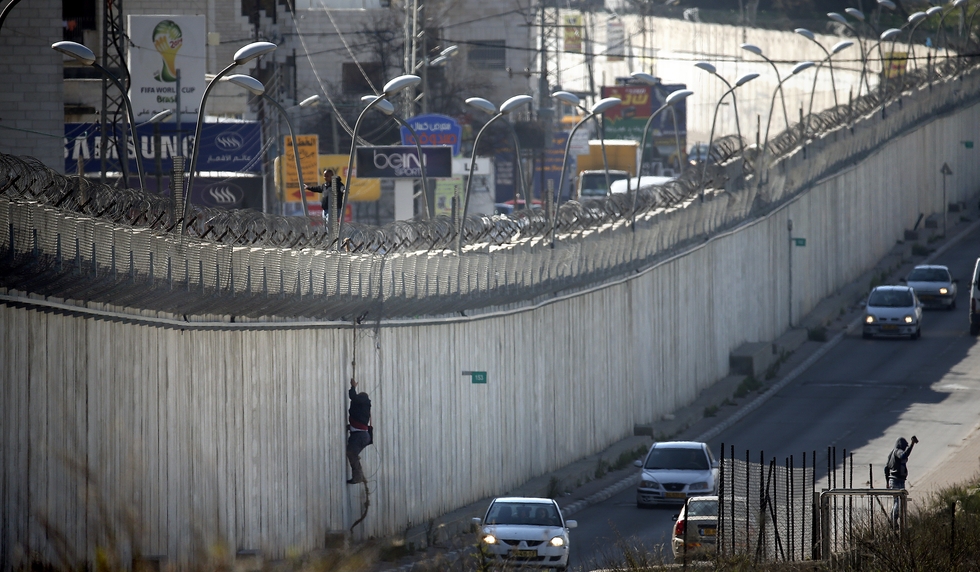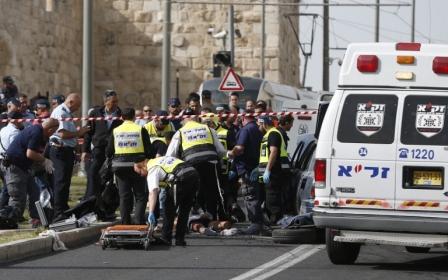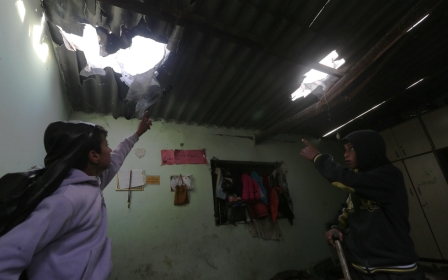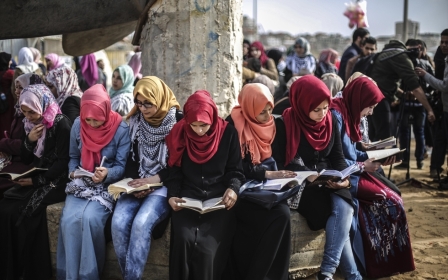Jerusalem attacker's family forcibly transferred to West Bank

When Maisa Tamimi was told that her son was shot dead in the Damascus Gate area of Jerusalem on Tuesday, she barely had time to register her shock before Israeli authorities sent her a summons for interrogation, her family told Middle East Eye.
Her son Fouad, 21, shot two Israeli border guards on 8 March before security forces shot him dead. The two guards were seriously wounded and evacuated to hospital.
On Thursday, the mother of nine, along with four of her children, made her way to the Muskobiyeh interrogation centre, where family members told MEE they were questioned harshly.
“It was a very tough interrogation, full of shouting and curses aimed at Maisa and especially her two daughters that were with her,” her sister, Amani Tamimi, told MEE. “The two girls were verbally abused in the most lewd way possible.”
At the end of the questioning, Maisa and her four children were taken in a police car to the Qalandiya checkpoint, which serves as a border crossing separating the West Bank from Jerusalem and Israel, effectively barring their return to their home in Jerusalem. As their mother, Maisa had no choice but to accompany them.
While this isn't the first time that Israel has expelled a family from Jerusalem, it is the first since the wave of attacks started at the beginning of October last year and happened, say activists, with "unprecedented" speed, raising questions about whether this is the beginning of a new policy.
The family was sent away so quickly that while Israeli authorities are expected to release Fouad's body on Sunday, the Tamimi's lawyer told MEE they will not be able to attend his funeral.
Mismatched IDs
Under Israeli law, Palestinian citizens of Israel or Jerusalem residents who marry Gaza or West Bank ID holders cannot live with their partner in Israel or Jerusalem.
Those from Jerusalem who marry Palestinians from the West Bank are forced to live in areas technically under Jerusalem's municipality, but on the West Bank side of the barrier wall - areas like Kufr Aqab, a squalid village that receives no municipality services, which has rendered it a trash-filled area that also suffers electricity and water cuts.
Until Thursday, however, the Tamimis had been living together in the East Jerusalem village of Issawiya, on the Jerusalem side of the wall. With a mix and match of residencies, they had long risked being torn apart: Maisa is a Jerusalem resident. Her husband carries a West Bank ID.
Maisa had enlisted a lawyer to help with the “family reunification” process, which would grant the West Bank ID carriers in the family with IDs from Jerusalem, permitting their residency under Israeli law.
But after Fouad carried out the attack on the border guards, the Israeli Public Security Minister Gilad Erdan ordered the police to examine the legal status of the Tamimi family, and they found that the family reunification application had been rejected.
As a result, Maisa’s husband was arrested and her four older children, aged between 14 and 19, were expelled from Jerusalem to the other side of the Qalandiya checkpoint.
The other four children, all under the age of 11, including two-year-old twin boys, remained at home in Issawiya - until Maisa collected them this week and brought them to the West Bank village of Bir Nabala, where her brother-in-law lives.
“The twins Omar and Amer, nine-year-old Razan and 10-year-old Abed all have Jerusalem birth certificates,” Amani said, “but obviously they can’t live alone. My sister had no choice but to bring them here so the family won’t be divided.”
“I’ve given the police clear instructions,” Erdan told Haaretz about the Tamimi case. “Anyone who is here illegally will be expelled.”
“We’ll continue to fight terror intensively on every front, and we’ll exact a steep price from everyone who supports, finances or abets terror."
'Unprecedented'
While there were reportedly 107 Palestinian residents of Jerusalem whose status was revoked in 2014, the last entire family to be expelled from Jerusalem was in 2015, Amjad Abu Asab, an activist in Jerusalem, told MEE.
In November 2014, Ghassan Abu Jamal and his cousin, Uday, led the attack on the Kehilat Bnei Torah synagogue in Jerusalem, killing five Israelis.
“Ghassan Abu Jamal’s wife had her and her children’s IDs revoked, and they were forced to move to the West Bank," Asab said.
But in that case, said Mohammed Mahmoud, a lawyer from prisoner rights group Addameer, the court process to expel Abu Jamal's wife and children took more than a year.
"Regarding the Tamimi family, the children were expelled almost immediarely," Mahmoud said, "which is unprecedented."
Mahmoud said the Israeli government exploited the family's residency status, which was still under application review, to immediately deny family reunification in the aftermath of Fouad's attack.
Amani said her sister was still in shock at losing Fouad, her first-born, and at the speed which turned her family’s life upside down. Maisa’s husband, who worked in Issawiyeh for the higher salary offered outside of the West Bank, is still in Israeli custody and has been charged with assisting his son in carrying out the attack, Mahmoud said.
Deterrent?
Asab said that the policy of family separation based on different IDs that has affected the Tamimis is part of a series of restrictions that the Israeli occupation practices against Palestinians living in Jerusalem.
“In Jerusalem especially, the authorities do their best to drain the Palestinian population financially, materially, even morally,” he said. “They extract large amounts of taxes from the trader, deny people building permits, and neglect their municipality services to areas.”
Abu Asab explained that any Palestinian in East Jerusalem who doesn’t tow the line risks being placed under surveillance and harassed by security forces.
“Even if you are outspoken against the occupation, let alone participate in a protest or throw a rock, your details will be forwarded to the ‘government crisis’ branch,” he said. “It’s a means to pressure families to make sure their children and relatives will not antagonise Israel in order to maintain some stability over their lives.”
Critics have regarded such policies as a form of collective punishment. In reaction earlier this month, Israeli Prime Minister Benjamin Netanyahu asked the state Attorney General Avichai Mandelblit to review a bill that would make the family separation practice fit with international conventions.
Netanyahu has said he supports the expulsion of Palestinian families of attackers to Gaza and regards them as a deterrent to future attacks.
“I request your legal opinion to allow the procedure of transferring families who assist terror to the Gaza Strip,” he wrote to Mandelblit on 2 March.
New MEE newsletter: Jerusalem Dispatch
Sign up to get the latest insights and analysis on Israel-Palestine, alongside Turkey Unpacked and other MEE newsletters
Middle East Eye delivers independent and unrivalled coverage and analysis of the Middle East, North Africa and beyond. To learn more about republishing this content and the associated fees, please fill out this form. More about MEE can be found here.




